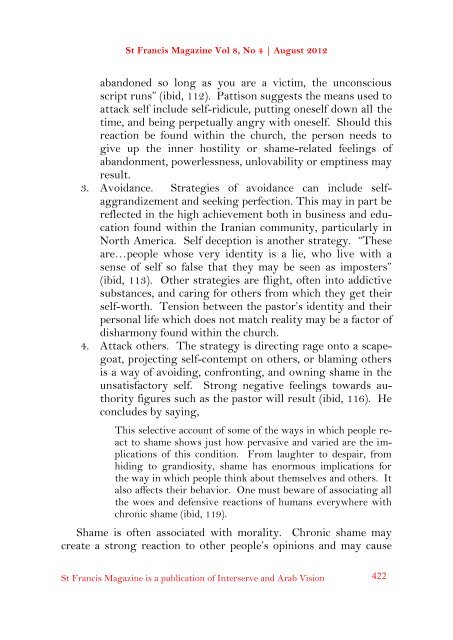download the pdf - St.Francis Magazine
download the pdf - St.Francis Magazine
download the pdf - St.Francis Magazine
Create successful ePaper yourself
Turn your PDF publications into a flip-book with our unique Google optimized e-Paper software.
<strong>St</strong> <strong>Francis</strong> <strong>Magazine</strong> Vol 8, No 4 | August 2012<br />
abandoned so long as you are a victim, <strong>the</strong> unconscious<br />
script runs” (ibid, 112). Pattison suggests <strong>the</strong> means used to<br />
attack self include self-ridicule, putting oneself down all <strong>the</strong><br />
time, and being perpetually angry with oneself. Should this<br />
reaction be found within <strong>the</strong> church, <strong>the</strong> person needs to<br />
give up <strong>the</strong> inner hostility or shame-related feelings of<br />
abandonment, powerlessness, unlovability or emptiness may<br />
result.<br />
3. Avoidance. <strong>St</strong>rategies of avoidance can include selfaggrandizement<br />
and seeking perfection. This may in part be<br />
reflected in <strong>the</strong> high achievement both in business and education<br />
found within <strong>the</strong> Iranian community, particularly in<br />
North America. Self deception is ano<strong>the</strong>r strategy. “These<br />
are…people whose very identity is a lie, who live with a<br />
sense of self so false that <strong>the</strong>y may be seen as imposters”<br />
(ibid, 113). O<strong>the</strong>r strategies are flight, often into addictive<br />
substances, and caring for o<strong>the</strong>rs from which <strong>the</strong>y get <strong>the</strong>ir<br />
self-worth. Tension between <strong>the</strong> pastor’s identity and <strong>the</strong>ir<br />
personal life which does not match reality may be a factor of<br />
disharmony found within <strong>the</strong> church.<br />
4. Attack o<strong>the</strong>rs. The strategy is directing rage onto a scapegoat,<br />
projecting self-contempt on o<strong>the</strong>rs, or blaming o<strong>the</strong>rs<br />
is a way of avoiding, confronting, and owning shame in <strong>the</strong><br />
unsatisfactory self. <strong>St</strong>rong negative feelings towards authority<br />
figures such as <strong>the</strong> pastor will result (ibid, 116). He<br />
concludes by saying,<br />
This selective account of some of <strong>the</strong> ways in which people react<br />
to shame shows just how pervasive and varied are <strong>the</strong> implications<br />
of this condition. From laughter to despair, from<br />
hiding to grandiosity, shame has enormous implications for<br />
<strong>the</strong> way in which people think about <strong>the</strong>mselves and o<strong>the</strong>rs. It<br />
also affects <strong>the</strong>ir behavior. One must beware of associating all<br />
<strong>the</strong> woes and defensive reactions of humans everywhere with<br />
chronic shame (ibid, 119).<br />
Shame is often associated with morality. Chronic shame may<br />
create a strong reaction to o<strong>the</strong>r people’s opinions and may cause<br />
<strong>St</strong> <strong>Francis</strong> <strong>Magazine</strong> is a publication of Interserve and Arab Vision 422







![Reflections on Surah Fatiha and the Lord's Prayer[1] - St.Francis ...](https://img.yumpu.com/49377951/1/184x260/reflections-on-surah-fatiha-and-the-lords-prayer1-stfrancis-.jpg?quality=85)









